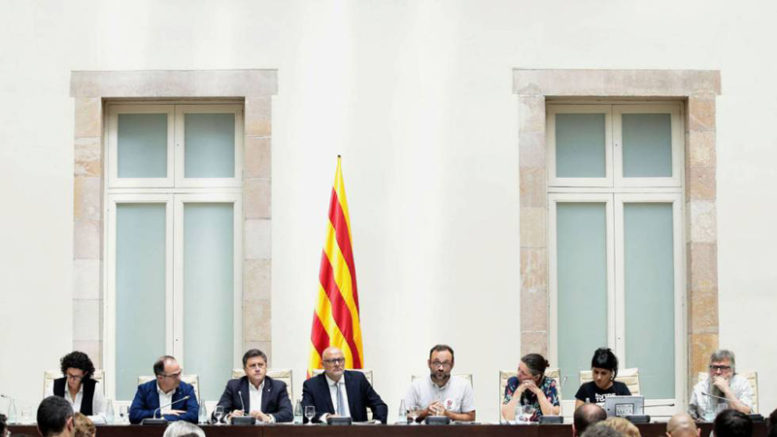• Junts pel Sí says Constitution trumped by new ‘supreme’ independence law
• Simple ‘Yes’ majority vote would trigger secession from Spain within 48 hours
During a special meeting Tuesday at the Teatre Nacional de Catalunya of legislators from Catalonia’s Parlament, boycotted by opposition members of the regional parliament from Ciudadanos, the Partido Popular (PP), Socialist party (PSOE) and a majority of the Podemos-backed Catalunya Sí que es Pot coalition, Catalan president Carles Puigdemont and the leadership of the region’s Junts pel Sí (Together for Yes) pro-independence governing coalition sketched out a timetable for Catalonia’s projected secession from Spain.
Before an assembly at the comprised of legislators belonging to the Junts pel Sí coalition, comprised of Puigdemont’s own Partit Demòcrata Europeu Català (PDeCAT, formerly Convergència Democràtica de Catalunya) and Vice-President Oriol Junqueras’ Esquerra Republicana de Catalunya (ERC, Republican Left of Catalonia), plus members of the far-left Candidatura d’Unitat Popular (CUP, United People’s Candidacy), the pro-independence leadership surveyed the main points of a secret independence law drafted behind closed doors, the full details of which have yet to be made public and which will apparently not be subject to full parliamentary debate prior to approval.
Also laid out was a timetable that calls for a binding referendum on independence to be held on 1st October, followed by a rapid declaration of independence from Spain within 48 hours if a simple majority of participating voters mark “Yes” to the question: “Do you want Catalonia to be an independent State in the form of a republic?” The scenario detailed Tuesday established no minimum number of ballots cast as a requirement for validating a victory for the “Yes” vote — meaning that no matter how low the turnout, a simple majority of “Yes” votes would automatically trigger a declaration of independence from Spain by the Catalan regional government within 48 hours of results being announced.
ERC’s Junqueras subsequently told news media that the draft independence law, which opposition parties complain has not been brought before the Catalan legislature for debate as required by parliamentary rules, is likely to be approved by a parliamentary vote of Junts pel Sí and the CUP in early September, less than one month prior to the scheduled referendum. Once approved by the Junts pel Sí/CUP majority in the Catalan parliament, the law is to be considered a “supreme law” in Catalonia, taking precedent over any other laws of Spain or the Spanish Constitution and exempt from any court ruling, including Spain’s Tribuna Constitucional (Constitutional High Court).
The Tribuna Constitucional has repeatedly ruled against the Catalan government’s bids to hold independence votes in the past, following appeals by the central government in Madrid citing the citing the Spanish Constitution’s clear prohibition of independence referendums.
In Tuesday’s presentation of the main points of the independence law and timetable for the referendum, the Junts pel Sí leadership said the process outlined is legitimized by a higher authority than the Spanish Constitution, citing the universal right to self-determination of all peoples as guaranteed by the UN Charter and international law. Critics immediately countered, with an editorial in the daily El País newspaper Wednesday noting that the UN Charter specifically refers to the right to self-determination of “peoples under colonial domination and other forms of foreign occupation” and that in any event the UN statutes make clear that secession or independence must be carried out in conformity with norms and laws that preserve the “territorial integrity of (member) States”.
In Madrid, the government of Spanish President Mariano Rajoy of the conservative governing Partido Popular (PP) has repeatedly said that a Catalan independence referendum would violate the Constitution and therefore it will not take place as long as the PP is in power. On Tuesday, Soraya Saenz de Santamaria, vice-president of the Rajoy government, vowed that within 24 hours of its approval by the Junts pel Si and CUP majority in the Catalan parliament, the new independence law outlined Tuesday will be invalidated as a result of a government’s appeal to Spain’s Tribuna Constitucional and the referendum process effectively stopped.
► Read More in Spanish at El País, El Periódico and Público …
► Read More in English at BBC News, Reuters and The Guardian …


